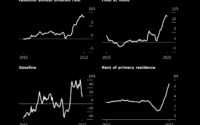IMF Says China’s Outflows Show Deepening Divergence With U.S.
(Bloomberg) — Sign up for the New Economy Daily newsletter, follow us @economics and subscribe to our podcast.
Most Read from Bloomberg
Investor outflows from China reflect a deepening divergence in monetary policy between the world’s two biggest economies.
The Federal Reserve has signaled aggressive rate hikes while the People’s Bank of China has eased policy, and that divide is eroding the yield differential between both economies prompting investors to look elsewhere, according to Helge Berger, head of the International Monetary Fund’s China mission.
China’s benchmark sovereign 10-year notes now offer no yield advantage over comparable U.S. Treasuries for the first time since 2010.
“It is the laws of international macroeconomics at work,” Berger said in an interview. “We are seeing a significant change in the relative interest rate position of China, which is highly correlated with slowing growth, while we have the opposite in key advanced economies, especially the U.S.”
Outflows from China’s stocks, bonds and mutual funds accelerated after Russia’s invasion of Ukraine in February. Global funds sold more than $7 billion worth of mainland-listed stocks via exchange links with Hong Kong in March and sold $14 billion in Chinese government debt over the past two months.
China’s economy slowing under the weight of rolling lockdowns to curb the spread of Covid-19 has prompted a wave of downgrades to China’s growth forecasts. The IMF tips China’s economy to grow 4.4%, down from a prior 4.8% estimate and compared with the government’s official target of about 5.5%.
That fading outlook and diminshed yield differential are weighing on the yuan, which fell to its weakest level in six months. Any signs of a slowdown in China’s export boom would also weigh on global investors.
Still, the pace of outflows appears to be contained, at least for now.
“What we are seeing is really small compared to the massive inflows we’ve seen over the past two years,” Berger said. “Both of these central banks are reacting to changing domestic conditions.”
Most Read from Bloomberg Businessweek
©2022 Bloomberg L.P.
[ad_2]
Source link


